When not brewing Christmas beer was illegal
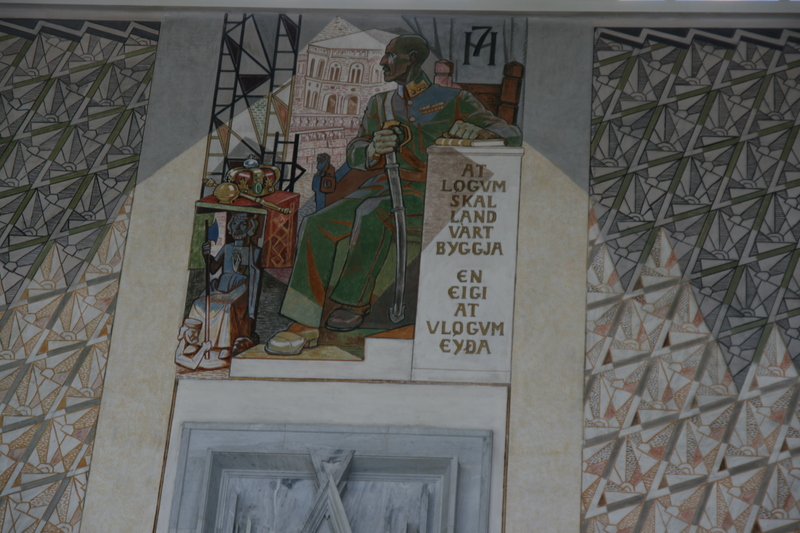
"With law is the land to be built, and not through unlaw to be ruined." Quotation from the viking-age Brennu-Njáls saga in Oslo city hall. |
There really was a time when not brewing Christmas beer in Norway was not just illegal, but even punished harshly. I realize this sounds like a tall tale, but it is documented far beyond any reasonable doubt. Which is of course quite confusing. Why was the law like this? That's quite a complicated question, it turns out.
The image most people have of the vikings is as rapacious sea raiders and pirates, which some of them indeed were. But the vikings were also famous traders and travellers, poets and statesmen, and even lawmakers. Viking society was actually a kind of democracy, although one in which only the so-called "free men" participated, and not on an equal footing.
Historically, Norway was divided into several regions, each of which had its own assembly, known as a "thing". The assembly was a combination of court, public square, and parliament, where court cases were heard and judged, new laws were agreed on, and important announcements were made. Western Norway had its assembly on the peninsula of Guløy north of Bergen. That assembly was known as the "Gulathing", and the law decided there as "the Gulathing law".
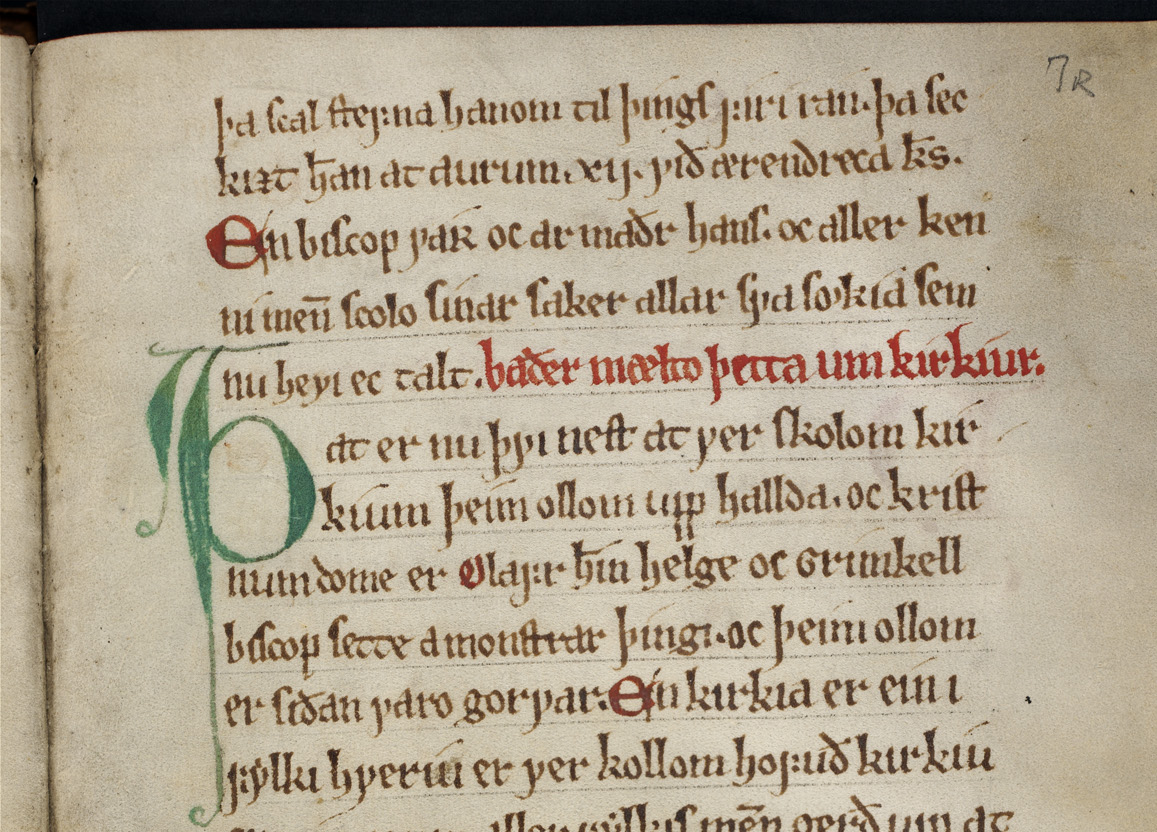
Facsimile of hand-written manuscript of the Gulating law, held in the Royal Library, Copenhagen. Wikimedia Commons. |
The law has come down to us in the form of four hand-written manuscripts, the oldest from the 12th century. The first part of the law is known as "the Christianity part", and paragraph 7 there is the one that requires beer brewing. It's interesting enough that I'm going to quote it in full:
Yet another beer brew we are required to make, man and wife from equal amounts of malts, and to bless it Christmas night in thanks to Christ and St Mary, for a good year and peace.
If this is not done, three marks must be paid to the bishop. But if someone sits three winters without doing so, or cannot pay the fees that we have added for our religion, and this can be proven, then he has forfeited every penny of his worth. The king shall have half, and the bishop the other half. But he may confess his sins and make church penance and stay in Norway. If he will not he shall leave the realm of our king.[6]
The beginning, "yet another beer brew", refers to the previous paragraph, where people were required to brew beer before All Saints' Day. This is the second beer the law requires everyone to brew. Note how harsh the law is: there is a steep fee to be paid if the beer is not brewed, and if the "criminal" persists in his crime for three years, he is to be deprived of all his possessions and might even be driven out of the country entirely.
To modern people this sounds bizarre. Why would the law require people to brew beer? It was not a stringent requirement, since beer brewing was of course something just about every household did at this time, especially for Christmas. But that in a sense makes it even more strange that the law should force people to do it.
Let's back up a little: Christmas is a very old celebration that existed in Norway (and elsewhere) long before Christianity was introduced. It was called "jól" in old Norse, and in Norwegian it's still called "jul". The origin of this word is the same as the English "yule". This celebration was the high point in the pagan annual cycle, and the church later deliberately co-opted it for Christian purposes, turning it into a celebration of the birth of Christ.
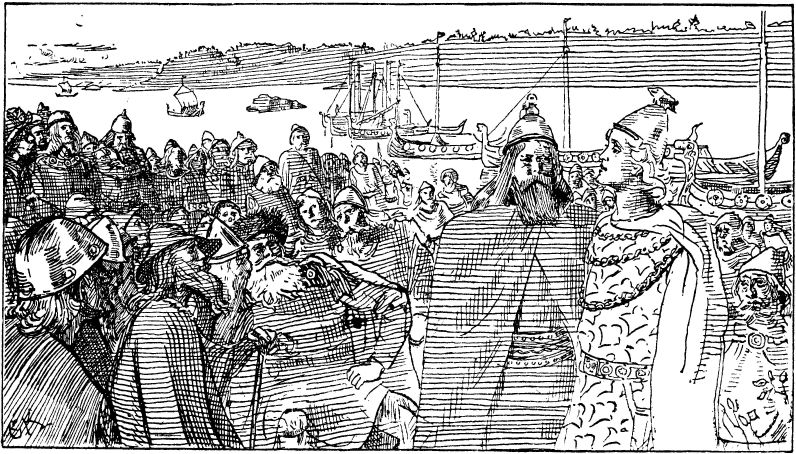
Håkon den Gode (right) speaking at the "thing". Drawing by Christian Krogh for 1899 edition of Snorri Sturluson's history of Norway. Wikimedia Commons. |
Snorri Sturluson writes that king Håkon the Good "made it law that Christmas should start at the same time as for the Christians, and that every man should brew from one measure of malts, or else pay fees."[3] So Håkon the Good seems to have added this paragraph. He was king from 934 to 961. Before that he was sent by his father, king Harald Fairhair, to the English king Athelstan for safe keeping, and was raised at his court.
Norway was officially christianized around 1030 CE, but the kings started pushing for it much earlier. The king who started this process was Håkon the Good, precisely because he'd been raised among Christians in England. It seems likely that the law was introduced not to force people to brew beer (which they did anyway), but to make them bless it in the name of the new gods. Snorri elsewhere writes that a high point of the ancient pagan yule feast was toasting in beer to the old gods, and it's probably this custom the king wanted to change.
That it was introduced at the same time when the dates for Christmas were made to fit Christian practice seems to indicate this. As does the phrase saying the punishment fees were "fees that we have added for our religion". That the paragraph appears in "the christianity part" is yet another hint.
This paragraph remained in force until 1267, when king Magnus Lagabøte ("Law-mender") made a new written version. He then replaced the regional laws with the first, national Norwegian law code in 1275. This new national law code built on the regional laws, but did not include the requirement about brewing for Christmas. Presumably because Christianity was sufficiently well entrenched by this point that there was no need. The farmers, of course, were still brewing for Christmas, as they had done for many, many centuries already, and as some of them still do today.
What's more surprising is that the law lived on in popular memory out in the countryside.
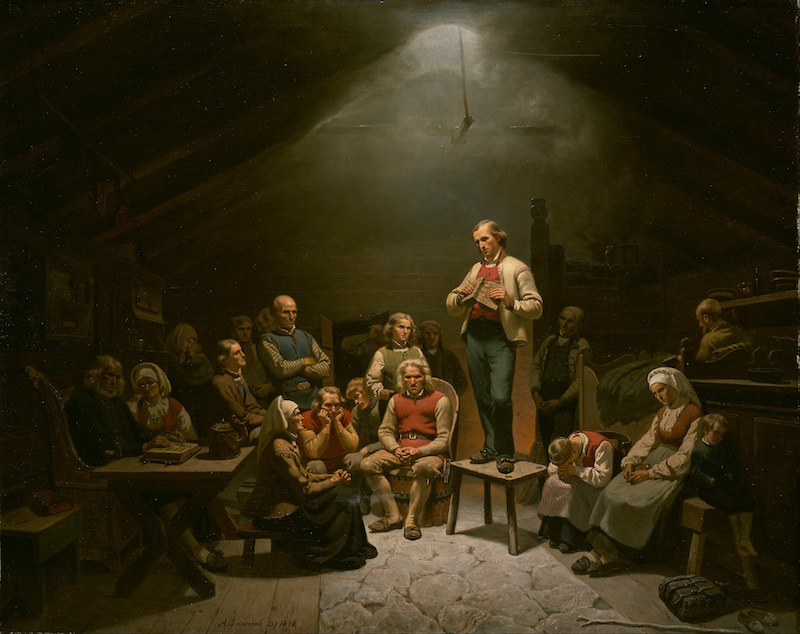
"Haugianerne", by Adolph Tidemand, showing a lay evangelist meeting on a farm somewhere in Norway. |
In the 19th century lay evangelists started a Christian revival movement, which was particularly strong in parts of southern Norway. Part of their preaching was directed against drinking and the brewing of farmhouse ale. Odd Nordland writes:
They wanted to abolish ale in Åseral. Then old Gyro [a woman] spoke up: "Whatever are they thinking of! We shouldn't brew? The King has said we are to do it," she said.[1]
It's clearly the old paragraph from the Gulathing law she has in mind, even though it was removed from the law more than five centuries before. This is not the only recorded example.
In the mid-19th century Eilert Sundt visited Heggebostad, also in southern Norway, to record their Christmas customs. There, an old woman told him that she had heard, "as though in a myth," that the king had decreed that the farmers must celebrate Christmas with beer[2].
This was in the 19th century, but the folk memory of the law seems to have lasted even longer.
In the 1950s Norwegian Ethnographic Research sent out a questionnaire on farmhouse brewing. In the far north of Norway one response refers to a 92-year-old man from Kåfjord in Troms, who said that people in that village before his time had distilled liquor and that the law had required them to do so[4].
I wasn't sure I believed that but a second answer says the same thing. "In Burfjord an old man said that his grandfather had told him that in the old days they made moonshine there — and that this was required by law."[5]
It seems pretty clear that these are actually distorted memories of the old requirement that people must brew beer. This was in the 1950s, but we're not quite finished yet.
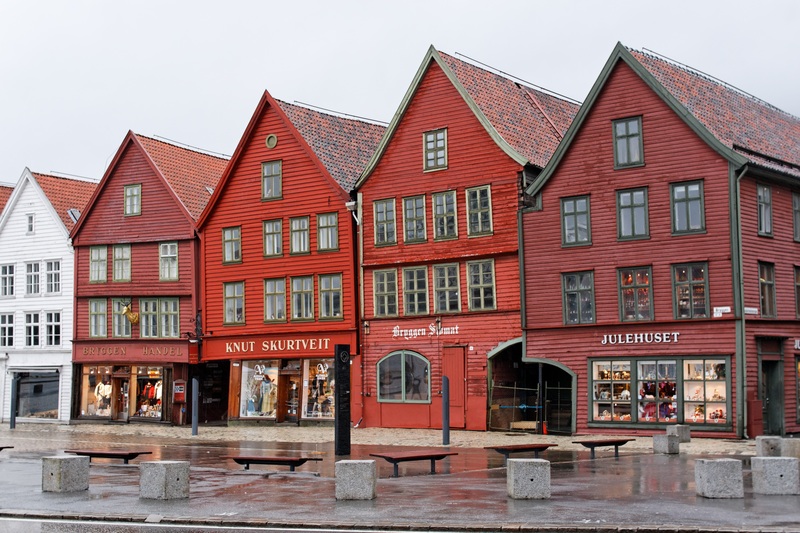
Bryggen in Bergen, 2010. |
In 2016 I visited Bergen Ølfestival in western Norway to promote my book, and while I was walking around trying beers an old man struck up a conversation. It didn't take long for me to start talking about the few traditional beers available at the festival.
Him: "My grandfather used to brew his own beer, you know."
Me: "Really?"
Him: "Yes, sure. He told me they used to be required by law to brew
for Christmas."
Me: "But that law went out of force in 1275?"
Him (laughing): "I'm not sure grandpa was aware of that!"
Did his grandpa really believe the law was in force? The old man went off before I got his name, or had the sense to question him more closely about it. But it's far from impossible that his grandpa thought this law was something that was in force for the generation previous to his own. Certainly, the belief had been alive not that long before.
Sources
[1] Brewing and Beer Traditions in Norway, Odd Nordland, Universitetsforlaget, Oslo, 1969, p148. Citing an unpublished manuscript from Johannes Skar.
[2] Om Ædruelighetstilstanden i Norge, Eilert Sundt, 1859, in section on Christiansands Stift, Listers provsti.
[3] Heimskringla, Snorri Sturluson, ca. 1230. In Hákonar saga gó∂a, paragraph 13.
[4] Norsk Etnologisk Granskning, spørreliste 35: Ølbrygging, Troms, NEG 16921.
[5] Norsk Etnologisk Granskning, spørreliste 35: Ølbrygging, Troms, NEG 18077.
[6] Lover om alkohol i Norge: fra landskapslovene til 1814, Rusmiddeldirektoratet, Oslo, 1988. Translation to English by me.
Similar posts
The true meaning of Christmas
People often lament that we need to pay more attention to the true meaning of Christmas, but I don't think they mean the same thing as me when they say that
Read | 2020-12-15 19:50
Norwegian farmhouse ale
It's a well-kept secret that in Norway there exists a homebrewing tradition completely separate from the modern homebrewing that's taken off in the last few decades
Read | 2013-10-27 13:24
The purity law
One thing I found very interesting in Germany was the attitude to the famous German purity law for beer (or Reinheitsgebot in German)
Read | 2005-09-17 16:55
Comments
Reuben - 2019-12-08 13:13:30
I'm going to have to use this to get back in to brewing and make a batch on Christmas.
Lars Marius Garshol - 2019-12-08 13:20:02
@Reuben: It's either that or you'll have to pay three marks of silver to the bishop.
Reuben - 2019-12-09 03:50:21
One of the two for sure, because I didn't do either one the last two years!
EDWARD (Ted) O'NEILL - 2019-12-09 15:00:25
I really like the ending comment about the guy's Grandad was not aware the law went out of force in 1275. Good excuse to be on the safe side and keep brewing!
Gustav Foseid - 2019-12-10 14:19:56
I have only been able to find the requirement to brew beer in the Gulathing law. Have you been able to find anything resembling this in the other regional laws?
Lars Marius Garshol - 2019-12-10 14:25:41
@Gustav: Yes, the Frostating Law has a requirement to brew for midsummer. Look at [6]. It's pretty easy to find in there.
Marco - 2019-12-17 00:50:30
I'm guessing that some of the more contemporary confusion about the status of the law could have been down to regional laws remaining in the books
Lars Marius Garshol - 2019-12-17 08:05:37
@Marco: Well, the regional laws did not remain on the books. That's the thing. They were completely replaced by the new national code.
But of course the main source for the old laws was not written texts, but the "law saying men", the people who had memorized the laws and could recount them when necessary. Most people probably knew parts of the laws by heart. So in that sense I guess the old laws remained in people's minds, and it wouldn't surprise me too much if remote parts of Norway in practice followed the old oral laws instead of the new written code, at least for a while.
John - 2020-03-10 11:33:17
'Malts' in Norway in the 12th century and 'many, many centuries' before that? I'm not aware of any evidence for this, beyond a few grains of barley supposedly found in an old pot. Local crops were prone to fail. Read the hunger. Timber was later traded for Danish malt, up until the end of Danish rule. Then the spud was discovered. Then Norwegian aquavit - potato moonshine.
'The image most people have of the vikings is as rapacious sea raiders and pirates' and. Indeed, pillaging, raping slave masters. They were Neolithic oafs isolated on the periphery for who know how long, by all accounts. One shouldn't confuse Norse society exclusively with Vikings. Such popularised history overlooks why the Norse were generally as keen to avoid Vikings as most Europeans were - why there was a Nordic 'refugee crisis' back then. Why Iceland was colonised by Norse and escaped slaves. And why so many Norse emigrated to Britain. Norway was an abysmal hell hole.
Lars Marius Garshol - 2020-03-10 12:32:41
@John: The law required every farmer to brew twice a year. For the other brew (not the one quoted above) it even specified the amount of malt that was to be used. How do you propose this would have worked if the farmers had no malt?
Yes, local crops were prone to fail, but people had learned to live with that. Conditions in the 18th century were not very different, and at that time everyone malted and brewed. So why not in the Norse period and before?
True, there aren't many malt finds from Norway, but there aren't that many from other places, either. Malt finds just aren't that common, so an absence of malt finds proves nothing.
People traded for malts at least from the Norse period, but probably earlier, too, because there wasn't enough grain for malt that people could brew as much beer as they wanted. This is why most people brewed 1-2 times a year.
All of this is well established and at this point utterly uncontroversial among historians.
The rest of your comment is too childish to respond to.
Andrew - 2020-03-11 08:36:12
Lars
First of all, great article. I appreciate how you took the time to setup the background for the origin of Christianity and Christmas in Norway. And citing your sources? Excellent stuff. Too bad you couldn't get more info from the man in Bergen.
More completely, however, I want to say how much of a treasure your blog is. I found it once or twice recently when I was trying to discover the origins of kveik in modern/global brewing practices. Your earlier posts detail a gravitation towards discovery that I found humbling and refreshing the first time around. But after seeing your name attached to the origin story of White Labs (and perhaps other commercial yeast) strains? I was floored.
Thank you for being a trailblazer and observer. Thank you for being patient and thorough, for documenting these brewing practices and ingredients that I and many others may have never had access to before you and your ilk came along. I know you've published books, but the fact that you still operate your blog - and respond to comments - shows you are truly a human being.
You deserve any and all recognition you receive for your part in furthering the boundaries of the beer world. Thank you.
Lars Marius Garshol - 2020-03-11 09:01:45
@Andrew: Thank you. That's very kind, and much appreciated.
Michael Spinelli - 2020-10-09 23:59:02
Lars, read your book over the summer and found it very entertaining and enlightening. I've been looking for beers to brew beyond the typical popular IPA. I brewed Brewed Roar Sandordden's Christmas beer. Believe it or not I found a malthouse in the US that produces Stjordal malt in a Sainnhus. Only issue is I have no frame of reference to determine if what I made is on target. It is heavily smoked with the alder smoke being the dominant flavor but I think I am picking up flavor from the juniper in the finish. Could you share some of your impressions of Roar's beer with me. I would love to just get some idea if I am on the right path with this. I am really interested in experiencing the flavors added by the kveik, but don't think this was the beer to brew for that. Again, congratulations on a great book, really enjoyed your humor as well. Thanks for inspiring me to pursue these methods and beers.